The Acer Aspire S7-393 Review: Broadwell Comes To Acer's Ultrabook
by Brett Howse on October 5, 2015 8:00 AM ESTBattery Life and Charge Time
Broadwell brought a lot of nice changes over Haswell. The move to 14 nm transistors from the 22 nm of Haswell brought about lower operating voltages, which results in less power being dissipated. This of course means better battery life too. The CPU is only a small part of the overall power output of a notebook, especially at light workloads where most of the CPU can be power gated. The display is a big percentage of the overall power drain on light workloads, and other factors come into play too like the wireless card and even the SSD – or both SSDs in this case.
Something pretty remarkable is that Acer has sampled us nearly identical Aspire S7 models for the past three generations. That means that we have battery life results on an almost identical notebook going back to Ivy Bridge. All three S7 models all came with the same resolution display too. There may be some changes to backlight efficiency, but overall we can look at a single notebook and see how much more power efficient it has gotten in three generations which is pretty neat.
All tests are done with the default browser (now Edge) and the display set at 200 nits.
Light Battery
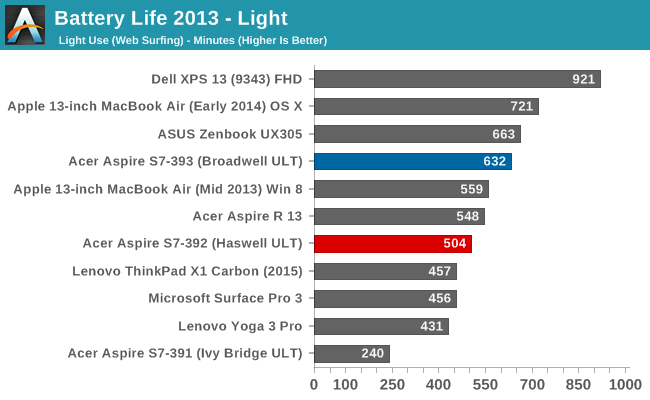
The light test consists of light web browsing with the display set at 200 nits. It is heavily influenced by the display, especially in 2015 where the processors are so power efficient at idle or close to it. The Aspire S7 does very well in this test coming in very close to the Core M powered UX305 from ASUS. Unsurprisingly it is no where near the Dell XPS 13 FHD model which blew past all other notebooks.
Looking at the past generations shows just how big of a jump notebooks have made in just a couple of years. The original S7 with Ivy Bridge got only 240 minutes, or 4 hours on this test, but the latest version gets 10.5 hours. Even compared to Haswell there is a big jump in efficiency.
Heavy Battery
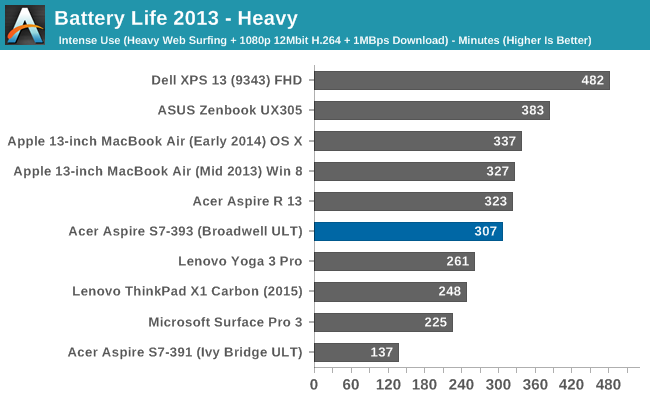
The heavy test ramps up the workload significantly, with much heavier web browsing combined with a 1 MB/s file download and a movie playing. The CPU becomes a much bigger factor here along with the wireless card.
Once again, the S7 does a reasonable job on this test. It has fallen a bit behind some of the other notebooks but not by a big amount. The exception is the Core M UX305, and of course the Dell XPS 13.
It is a pity, but the Haswell version of the S7 was not run through this test so we do not have a result from it, but clearly Broadwell is a huge step up from Ivy Bridge in terms of efficiency. The latest S7 is 124% more efficient at this test than Ivy Bridge. Impressive stuff.
Normalized Results
Next, we divide the time by the battery capacity to remove that from the equation. This gives us an apples to apples comparison of efficiency across devices.
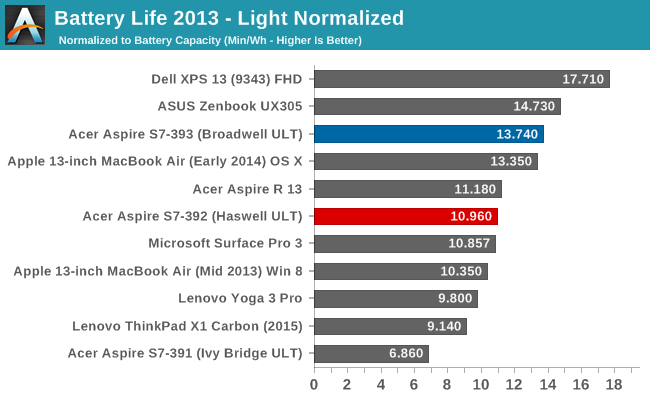
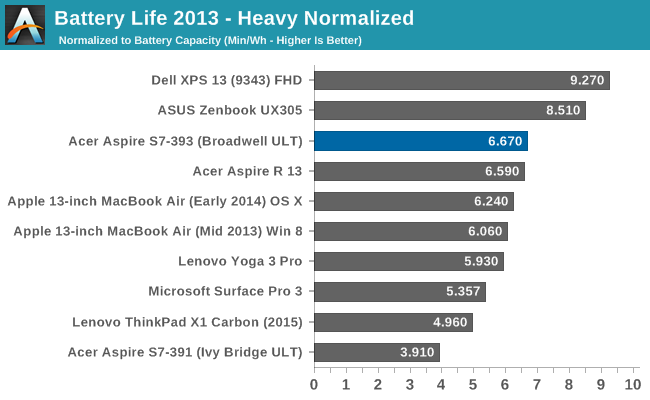
Acer has done a good job with platform efficiency, coming in as one of the higher results seen. It is really held back more by the 46 Wh battery, which is slightly below average as far as capacity on this size of an Ultrabook. Clearly a redesign would be the only way to squeeze in more battery capacity since it has not changed since the first S7. But despite a slightly smaller battery, the S7 still scores as one of the longest running notebooks we have seen, if you ignore the XPS 13 and its silly battery life.
Charge Time
The other side of the power equation is charge time, and while it may not be important to everyone, those times where you are travelling and only have a couple of minutes to grab some electrons before you move on having a quick charging notebook can be a big benefit. Acer has included a 45 Watt A/C adapter to charge the 46 Wh battery.
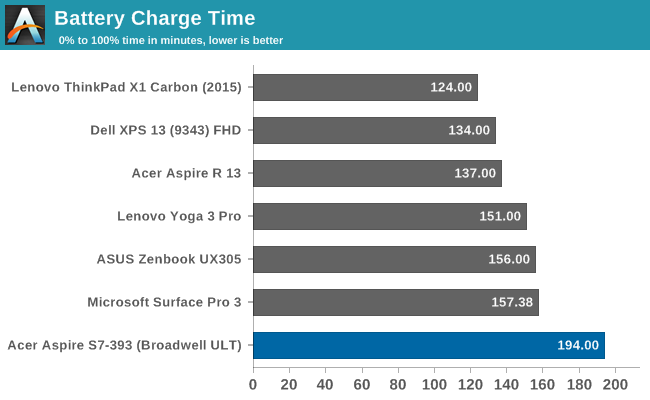
The Acer S7 takes a bit longer than most devices to get to 100% when it is powered up like it is in this test. It is always a trade-off to include a larger adapter because they can get big and heavy, and make it less useful to travel with.










63 Comments
View All Comments
smorebuds - Monday, October 5, 2015 - link
the hyperbole is strong with this onecgalyon - Monday, October 5, 2015 - link
While "perfect" is probably an understatement, it was quite good, except the keyboard. I make no exaggeration when I say that it was not possible to type much more than a short word without having to make a correction. People were modifying registry files in an attempt to compensate (by changing the latency between detected key presses)DanNeely - Monday, October 5, 2015 - link
I'm a bit surprised that Acer would want you to review a Broadwell model now when Skylake is out. Was this laptop stuck in your todo queue for a while?lmcd - Monday, October 5, 2015 - link
Most of Skylake is a connectivity upgrade, no? Which would be lost on a unit like this, with nearly no connectivity to speak of.DanNeely - Monday, October 5, 2015 - link
That's true for desktop processors. On the mobile side, improvements to power management and a bigger IGP have potential to make significant improvements to some performance numbers.lilmoe - Monday, October 5, 2015 - link
Acer probably got a better deal for those parts...p1esk - Monday, October 5, 2015 - link
Those specs at that price would be OK back in 2012. But now? At $799 it could sell a few. At $999? Meh, no thanks. At the asking price? You gotta be completely crazy.kmmatney - Monday, October 5, 2015 - link
I'm pretty sure Intel is charging up the nose for the Intel Core i7-5500U - easily adds a few hundred to the price over an i5.solipsism - Monday, October 5, 2015 - link
May I request when detailing the USB ports going forward to make clear if it's USB-A or USB-C.lilmoe - Monday, October 5, 2015 - link
"Something pretty remarkable is that Acer has sampled us nearly identical Aspire S7 models for the past three generations"I would have gotten excited here since I wanted a good comparison between Haswell and Broadwell in terms of efficiency. But I'm not sure if even this is a good comparison since you're not using the same browser for battery life tests. Edge is the most efficient browser on Windows.
It would have been nice if you also posted battery tests using IE for this particular product since you have identical specs other than the CPU.
On to the product itself, dat screen is seriously awful... The price tag is a bit high. Otherwise, not too shabby.